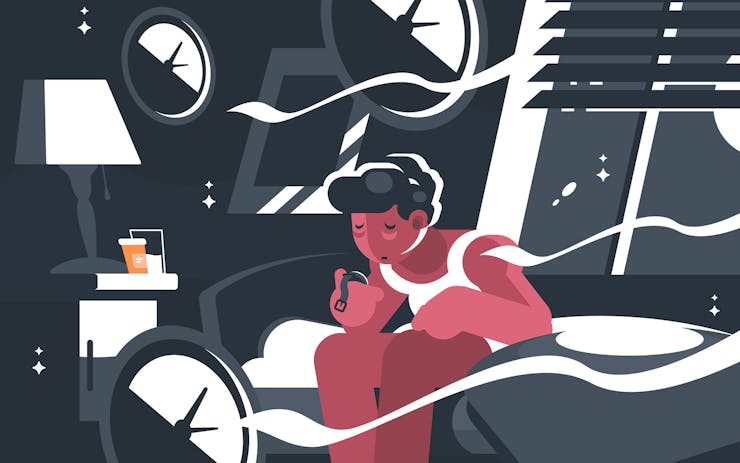According to the US Department of Veterans Affairs (VA), psychotherapy and sleep aid medications are the most common first-line treatments for solving PTSD-related insomnia. Beyond making sufferers sleepy and irritable the next day, chronic insomnia is associated with serious long-term health issues, including cardiovascular disease, diabetes, and obesity.
Medical marijuana is a particularly popular option for veterans who don’t want the side effects of the pharmaceutical suggestions most often used, such as sedatives like zolpidem or other drugs like clonazepam and trazodone.
Some research suggests people using medical marijuana may fall asleep easier and sleep longer.
Beyond anecdotal evidence from medical marijuana advocates who are military veterans, scientific research suggests that medical cannabis may be a promising option for treating insomnia.
Though more research is needed, the National Institute on Drug Abuse (NIDA), National Institutes of Health (NIH), and the global pharmaceutical company Sanofi-Aventis funded a study that showed consuming THC enabled subjects to fall asleep easier and more quickly.
Other research has been similarly suggestive that medical marijuana may help people have an easier time falling asleep and sleep longer and better, helping facilitate deep sleep, which in turn is thought to play a vital role in the natural bodily restoration process.
To hear more about PTSD, insomnia, and medical cannabis, listen to the third episode in the Zana/Leafly insomnia podcast, “Eyes Wide Open.”
Listen to “Zana HealthLab” on Spreaker.
PTSD as a qualifying condition
While the VA says more scientific research on PTSD and medical marijuana is needed, the anecdotal evidence is strong.
Amanda Berard, a military veteran from Texas, wrote about PTSD and medical marijuana for her master’s thesis in nursing at the University of North Texas. The sexual assault Berard experienced in the Army at age 19 led to PTSD that she says led to depression and hypervigilance. In Texas, her condition is typically treated with pharmaceuticals.
“You’re given a cocktail of medication,” Berard explained in a February 2017 interview with San Antonio’s KENS5 news. “A cocktail of pharmaceutical pills. I have five or six different medications that I’m supposed to take. The prescriptions, I feel, are like a Band-Aid solution.”
Berard is now an advocate with the Texas chapter of the National Organization for the Reform of Marijuana Laws (NORML). Like other veterans, Berard is working to try to raise awareness of the many lives that might be transformed for the better if medical marijuana were an option for veterans in all states. That’s available to veterans in many legal MMJ states—but not all. Some states do not include PTSD on their list of qualifying conditions. Berard fought to advance a medical marijuana bill in the Texas state legislature this past spring, but the bill ultimately died in mid-May.
Other states have been more progressive, although it hasn’t been without a fight. (Surprisingly, one state you’d assume would have PTSD as a qualifying condition years ago — Colorado — is only now on the verge of adding it.) PTSD is now a qualifying condition in most other jurisdictions where medical cannabis is legal.
And, that’s certainly good news for vets who find cannabis is not only more effective than prescription treatments, but safer and less addictive.





